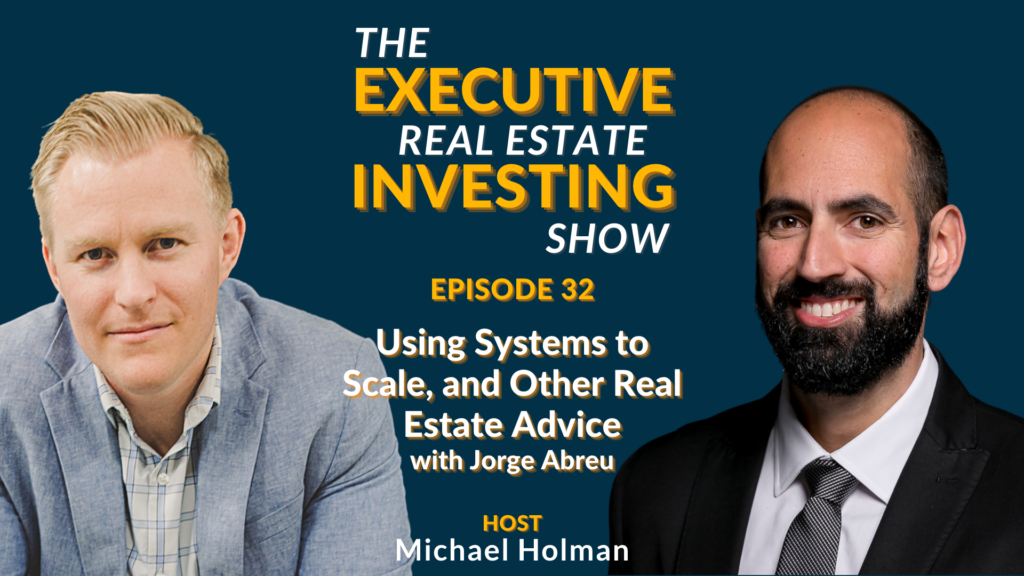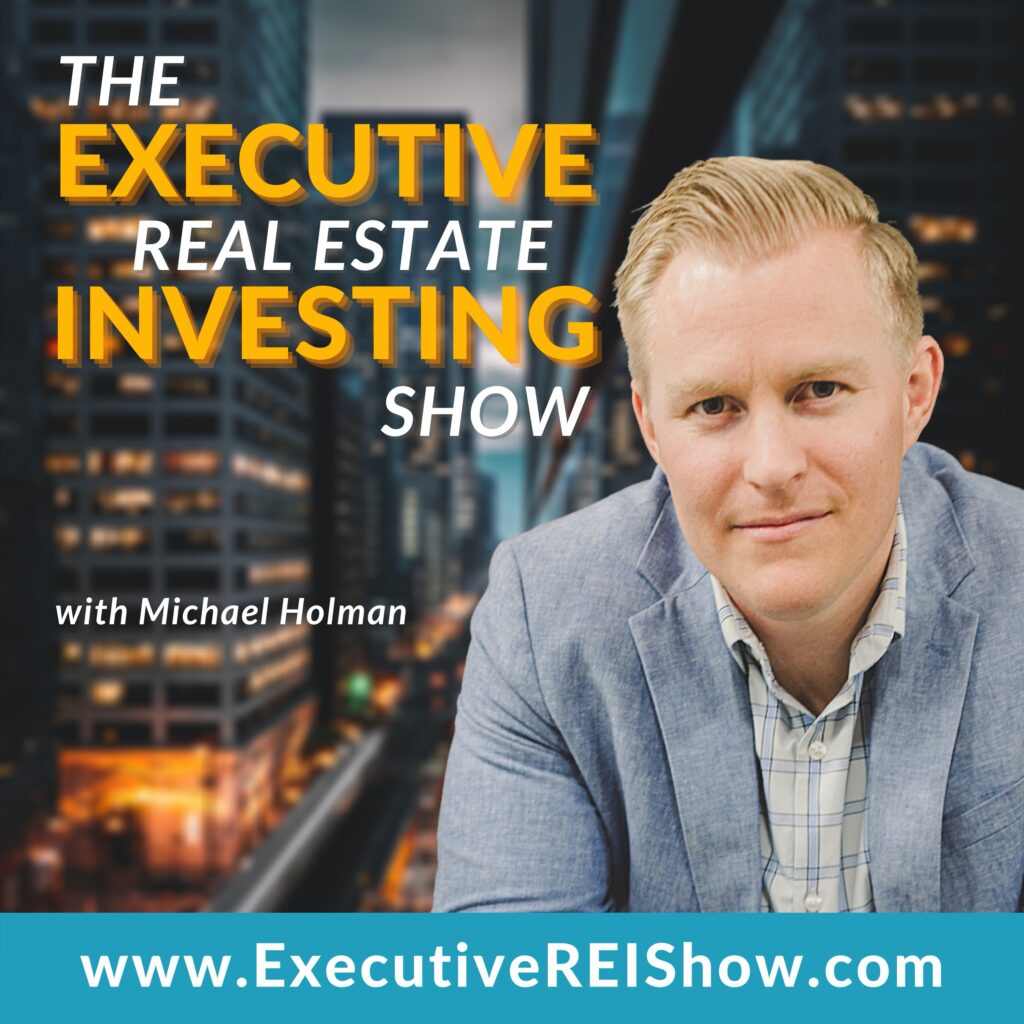
The executive Real estate investing Show
EPISODE 32
Using Systems to Scale, and Other Real Estate Advice with Jorge Abreu
- January 10, 2022
EPISODE SUMMARY
This week on The Executive Real Estate Investing Show, host Michael Holman talks with Jorge Abreu.
With more than 15 years of real estate investing experience under his belt, Jorge Abreu has seen more than his share of the ups and downs of the market. And the ‘downs’ have taught him the importance of doing due diligence on sponsors and investors alike. Abreu came from the construction management world, and slowly transitioned into real estate—first with single family fix and flips and rentals. When that took off, he formed his own investment group, and later, a construction company to manage renovations.
Listen now to hear Jorge talk about his businesses, how he creates systems and processes, and why doing your due diligence matters so much for real estate investing.
EXECUTIVE TIP
Be Confident in Yourself and Your Abilities
LISTEN TO THE PODCAST HERE

The Executive Real Estate Investing Show Podcast
EP 32: Using Systems to Scale, and Other Real Estate Advice with Jorge Abreu
Listen on
READ THE TRANSCRIPT HERE
Note: Audio transcription has been automatically transcribed
Welcome to The Executive Real Estate Investing Show. This podcast is for you, the busy business owner or executive looking to create generational wealth. Here, we’re going to show you how to do that through real estate investing from multifamily to industrial and everything in between. You will become a real estate investing expert. And now, here’s your host, Michael Holman.
Michael Holman: Hello everyone and welcome to another episode of The Executive Real Estate Investing Show as always, I’m your host, Michael Holman. And we have an amazing show today. Jorge Abreu who he likes he’s even given me permission to say Abreu, but I’m going to try and pronounce it correctly through this whole thing.
He is awesome. He’s the one of the things that I loved about this conversation with Jorge is there so many little things that if you’re just paying attention that you can pick up on through this conversation just about his mindset and what he’s doing, and I love. Even through this, right?
He’s not super aggressive. But he has been killing it. He’s been doing so much in the real estate space. He has a wealth of knowledge and you need listen into this because he’s got so much good information to take from an all of these little nuggets. And it’s almost like you have to be paying attention.
Because he doesn’t come out and just say, but he’ll allude to it or he’ll make, you know, he’ll make this little comment and it’s fantastic. I love it. I love it when you have to go searching through it. So this is going to be a good one. You’ll want to listen to this. That being said, we’ve had so many amazing guests and we have so many people listening to the show time and time and time and time again.
Our listeners are just going through the roof right now which we’re really excited about. If you’re liking, go ahead and hit subscribe and do me a favor, right? Go ahead and leave us a rating and review that would really help us out. We really appreciate it. That’s going to get this show to more people and it’s going to allow more people to hear our conversations with people like Jorge who’ve done amazing things. They’re trying to get to 10,000 apartment units under management in the near future. Just amazing. So go ahead, hit subscribe, leave us a rating and review. Really appreciate it. Also check out the website, www.ExecutiveREIShow.com. Check out all the old episodes you sign up for the newsletter, ask an executive question.
Whatever the case may be. You can find that on www.ExecutiveREIShow.com. And as always, we’re going to start today’s show with the executive tip and today’s executive tip. I’m actually going to piggyback off of something Jorge said and mentioned, and he’s going to get into this more, but the executive tip for today is to be confident in yourself, in your abilities and what you do.
You know, that is one of the most important things I think in business and being confident means different things for different things. All right. Sometimes when we think of confident people, we think of, we think of people who are maybe a little bit arrogant, but that’s not what this means. Right? You can be extremely confident in yourself and in your abilities.
And I think what that means is that to me means trusting the decisions and the actions that you’re taking are going to lead you to the right solution. And if they don’t, it’s being confident that you’ll be able to pivot and you know how to get to a right solution. So today’s executive tip – Be confident in yourself, in your abilities.
And with that, I’m not going to delay any longer. We’re going to get right in to today’s episode with Jorge. It’s fantastic. And you’re going to want to listen to this. Hello everyone and welcome to The Executive Real Estate Investing Show. We have a fantastic guest with us today, and I am going to pause before I say his name.
Cause we, we were just talking about it and he has like, he’s been called everything. Apparently, there’s a couple of baseball players though that have helped him out. So Jorge, you’re going to correct me if I’m wrong or if I say it wrong here, but we now have with us, Jorge.
Jorge Abreu: You nailed it, man. All right.
Michael Holman: He gave me permission to say Abreu, but I just, I feel bad. You can’t invite someone onto your podcast and call them by the wrong name the whole time.
Jorge Abreu: And the funny part is I’m having you call me Jorge, but, but you nailed it. Spanish last name.
Michael Holman: I love it. Hey, well, I’ll take it, Jorge. And thanks for coming on today.
We’re really excited to have you. You have been what feels like everywhere. I mean, every time I turn around whether it’s social media or I’m talking to somebody, it feels like. Your name seems to come up. Every event that I get invited to. I see you on the guest list. I have yet to go to a lot of these events, just cause it’s been a crazy year.
And I know it’s been a crazy year for you to but I’m really excited that we now are going to now get to hook up and have this conversation. So once again, thank you for joining and just so all our listeners can get to know you a little bit better, Jorge. I, to introduce you.
Jorge Abreu: Absolutely man. So I am a real estate investor.
I’ve been one full-time for about 15 years now. Done everything from single family, single family, wholesales, single family rentals, fix and flips ground up then jumped into small multifamily, same thing. Flip them owned existing built ground up. And what I, a hundred percent focus on now is large.
Multi-family a hundred plus units. I’m been doing that for, that’s been my main focus for about four years now. I am closing this year out with a little bit over 5,800 units that have acquired. We did sell some this year. Awesome. So yeah, assets under management, I believe is somewhere in the high 4,000 units.
Michael Holman: That is fantastic. No that’s and like I said, you you’ve been everywhere. It sounds like this has been a big year for you. How has 2021 treated you? How’s it gone for you in this, in this regards?
Jorge Abreu: Yeah, man. I mean it’s been it’s been a great year, so obviously last year was, difficult and went into last year with, with a lot of traction and momentum.
And then I felt like I just got uppercutted. You know, we, I took a lot of time couldn’t close on deals. I was working on systems and the team and just perfecting all of that. And it really started paying off towards the end of last year and then rolled right into 20, 21. And man, it’s been, it’s been crazy, you know, we closed on, it’s going to be 16 properties total.
So it’s, it’s been on that. It’s been fun.
Michael Holman: Yeah, no, I bet it sounds, it just sounds crazy. That’s the thing that it keeps coming to my mind, right. With, with how much you have going on and how much you’re doing. It just sounds, it just sounds crazy and I love it. So one of the things that you kind of mentioned.
There was really interesting that I want to take just a second and ask about, you talked about, Hey, getting the people in the systems in place and taking a step back and that kind of pay dividends. What are, what are some of those systems that you implemented or who are the people that you got that you felt really helped grow your business?
Jorge Abreu: Yeah, so some of the systems having to do with, with acquisitions, for sure. Creating our specific criteria of what we’re looking for. And then you know, what exactly we’re looking for on the front end? When, when, so not only do I have brokers that bring us deals, but I also have other investors that, that bring us deals to, to help them close on it and pretty much run the deal.
You know, that way they get to get their name on some deals and also learn and participate. So with that said, it’s, it’s easier said than done. Right. You know, I get thrown at me left and right. So there, there has to be a certain system in place to be able to funnel that and, and put the focus towards the good deals and the ones that fit what we’re, what we’re going after.
On the equity side, you know, we, we made a lot of automations and, and same thing with the CRM and our investor portal. And then with asset managers, same thing. Right. The really zoning in on the KPIs we’re looking for and, and how we track those on a, on a weekly basis. And then how we communicate with our investors.
We pretty much do everything out of our investor portal now, which is great. You know, it makes it a lot easier to communicate with the investors. And then bringing on the team members, like you said, you know We just brought on a full-time analyst and I’m exactly going to be bringing somebody on for acquisitions here soon.
And then probably investor relations is next. So kind of tackling all those bottlenecks before they become bottlenecks as we grow.
Michael Holman: Yeah, no, I, I completely understand. And, and the things that you had mentioned, I mean all of those things, right. Are so important, important as a real estate investor especially as, as general sponsor, right?
And as a general partner throughout this, that you have to have all of those things in place. And one of the things that kind of caught my attention as you were going through all this. Is KPIs and metrics. And one of the things, one of the questions that I get asked all the time, not only in this podcast, but even with investors outside of this show is, you know, what, especially new investors, what can I expect when investing in real estate?
And I know, I believe you focus specifically on multifamily. When you get asked that question, what’s your name?
Jorge Abreu: What can I expect investing in real estate?
Michael Holman: Exactly. What, what kind of returns can I expect when I, when I invest in real estate?
Jorge Abreu: Gotcha. So, I mean, there’s a couple of different things there. Usually I start off by explaining some of the tax benefits. And obviously I tell them to go with their CPA and see how much of that they can take advantage of.
But, you know I think that’s huge and that’s not even getting to the returns yet, you know? And then I explained to him how we do our distributions. You know, we have quarterly distributions cash on cash depending on, on the type of deal. So. Yes, we focus on multi-family, but we’re pretty diverse within multifamily.
So, you know, we’ve got our class A, or class B or class CS. We do some ground up stuff as well. So all of those have different metrics on returns mainly. Some you’re going to get more cashflow on some, you’re going to get bigger returns, but less cashflow is essentially what it comes down to. You know, explain to them how, how we as deal sponsors, communicate with our investors and kind of walk them through the expectations on that end.
Michael Holman: That’s fantastic. And I love to hear that you know, I play almost exclusively in that, in that new development sandbox. And so this is a conversation I have all the time, right? Is that balance between, Hey, depending on what you’re getting, it’s cashflow versus return, right? Like new development, for example.
You know, when we’re doing 200, 300 unit ground up developments, it’s like, look, you’re, there’s no cashflow for two to three years because we just kind of build the thing, you know, we’ve got to build it, we got to lease it up. But at the end of the day, you know, eight might be worth 40 or 50% more than what we originally built it for.
Jorge Abreu: Yeah. So the total return should be larger on a, on a development project versus. You know, the cash flow aspect of it.
Michael Holman: Exactly. Well, and one of the things, right? I mean, if you’re if you’re not watching this on YouTube, maybe you’re listening to it. What I’m looking at behind Jorge here is he’s got his, his company’s right.
Elevate com commercial investment group and J and T construction. And I’m really excited to talk to you. Both of those and how they work together because Jorge, you are one, we are, we also are vertically integrated. Right? We do development, construction management, and you are one of the very few people that I have ever brought on this show that has both of those components.
Right. You have the investment group and you have the construction side. What led you to do both of the sides of those?
Jorge Abreu: You know, I think so it started with because of single family. So I was scaling single family. I was doing high volume and the bottleneck I ran into where the contractors, I couldn’t find enough good contractors.
We got burned a few times. And that’s when I decided to open the construction company was to be able to scale the single family. And then when I made that transition over to multifamily, I’m still at the construction company obviously, but I noticed not a lot of multi-family investors had that and they were really relying on their, their property manager to do a lot of this.
And they were, their expectations were not being met because. You know, they’re putting a lot onto a property manager, not a construction company to be able to handle both aspects. And you know, right away, I noticed that, okay, you know, I can bring in the construction company it’s going to be a game changer and it’s definitely helped out.
I get with why a lot of companies kind of investors multi-family investors. I guess the first bottleneck they run into is more of the management. Right. And they don’t really think of the CapEx, but when, what we’re mainly doing is value add deals. I mean, the cap ex is pretty darn important. So yeah, man, I think it’s, it’s, it’s worked out.
Michael Holman: I love it. I love it. And, and I just have to ask, right. Some of your deals that I’ve seen have been pretty big. So what just random side question? What is the biggest CapEx project you’ve ever you’ve ever had to do to 10 million?
Jorge Abreu: We’ve got one lined up for next year. That’s 24.
Michael Holman: Oh my goodness. Jorge that’s like a, that’s like a new develop.
Jorge Abreu: It’s a massive property, but yeah, it’s 150 units
Michael Holman: Oh, wow. That is awesome. Oh, my goodness K 24. I just barely built a 116-unit project for 25 million. I couldn’t do that nowadays, but when we, when we locked in contracts two years ago, we could do it. So your cap X budget is what my what my new development budget was on that recent project. That’s hilarious.
Jorge Abreu: Yup. Yup. Yeah. You know, I’m answering renovation wise, CapEx was not even including the, the new development. Yeah. I was going to say, that’s just, that’s just CapEx.
Michael Holman: That is well, 850 units is awesome. Really excited for you, really excited about what’s going on. You know, how do you find balancing?
Do you find that you have to split your time between the two of these groups a lot. I mean, this is something, so I, let me preface this question by saying a lot of our listeners are doing with this same type of situation, right? They’re growing companies they’re building companies, they’re adding pieces and different verticals to their company.
And one of the questions that often comes up is, you know, how do I, how do I deal with these two different. Companies that both feel like they require all of my attention in order to be able to scale. How, how have you managed to kind of balance having both of those?
Jorge Abreu: Yeah. No, it’s not easy.
Right? So I wouldn’t suggest to anybody to think right off the bat. Okay, I’m going to go into multifamily. I’m going to start my syndication investment company, whatever you want to call it. And then I’m also going to do construction in-house and I’m also going to do property management in-house because then you’re literally starting three companies.
However, you look at it, even if you, you know, you brand them all the same and you don’t do any third-party work and it’s just all in-house. It’s still three different companies. So it worked for me because at the time that, you know, one, I had already established an investment company, but even changing that over to multi-family, it was kind of starting from scratch in a sense.
But the construction company wasn’t, you know, the construction company I had the team we had already started doing. Multi-family re renovations and some commercial work, and we were getting more focused on that end. So it wasn’t like I was starting that from scratch. It was more of just a little transition.
So I was able to do it and I was able to focus more on the investment company and building out the team there. And now that I’ve got that it’s I can, you know, equally bounce around and, and I’m not going to nuts.
Michael Holman: Yeah. I love it. It’s just a little nuts and I’ve seen the, I seen all the traveling and heard about the traveling you’ve been doing.
You’re going nuts, but in a good way, in a very good way. Well, I love that. That’s that natural progression because. Right. As we get going and we want to build these businesses, we get so excited and we just try and do everything all at once. Right. We get a little impatient before we actually get really, really good at something.
Jorge Abreu: That’s what I always tell people, focus concrete same thing with, with different aspects of different real estate classes, right? Like, don’t try to do a storage, a mobile home park, a industrial, and a multifamily and like conquer one, man. And then, and then you can get more diverse.
Michael Holman: Yeah. I love it. Well, that perfect transition. I we’ve been talking about multifamily. Are you exclusively investing in multifamily right now?
Jorge Abreu: It’s definitely the majority, but I’ve been doing crypto for, for awhile cryptocurrency. I, I just invested in a Bitcoin mining fund. What else?
You know, I’ve got some other investments here and there, but definitely majority is multi-family real estate.
Michael Holman: And do you do any other asset classes within real estate right now?
Jorge Abreu: On the new development. You know but even then it’s, it’s going to be a mixed use where we’re, multi-families the main component.
But no, right now I’m not, I’ve looked at storage quite a bit. I I’ve got one. I keep putting off and I probably need to go off it’s right by my house, man. And you know, I’ve got a good plan where I can buy land and the storage and kind of just build more storage. I just, somebody else is going to jump on it by the time I get on it.
Michael Holman: I love it. Well, then that begs the question, right? And maybe it’s part more of these natural progressions that you’ve had throughout your career, but why multifamily? Why, why is that the asset class of choice for you?
Jorge Abreu: it’s the one that felt the, the safest. You know I was in real estate before 2006 and the whole burst of the bubble
So I’ve seen a recession and I looked back and I look at that and I noticed that multi-family was not nearly as affected as some other classes. Then going back right now to COVID. Kind of the same story, you know, you had some other ones that did well, but it’s just, people are always going to need somewhere to live.
Right. And, and the way things are going, it’s only with single family pricing getting so high. I mean, it’s just only attracting more people to having to rent versus buy. So to me, it’s, it’s a safer bet that still has much better returns than you can.
Michael Holman: Elsewhere. Yeah, no, I love it. And I completely agree.
That’s one of the things the, the, you know, I know we love about multifamily as well is because, you know, it’s it, you said it exactly. I mean, when you boil it down to its simplest form everybody needs a place and all the things that you had mentioned and said all go into that and you can get lot more sophisticated than that, on why all of those levers and why all those things are happening.
But I, you said it perfectly, I believe in, in the simplest form, right? It’s just look, people need a place to live. Stuff’s getting expensive. And when it gets expensive, You got to rent. If you can’t buy, if a house that was $300,000, two years ago is now $600,000. You know, that can be a really difficult transition to make, to go buy that $600,000 house.
And so. I love what you’re saying. And I love the simplicity of, of how you phrase that in your you know, I feel like it’s just so relatable to everybody. Whether, whether you’re a seasoned real estate investor or you’re brand new and you’ve never invested in real estate ever. One of the things to tack onto that too, is you can even just look at lenders.
Right. Lender’s on multifamily alarm. They love it. I mean, there’s not, I I’ve talked to hundreds of lenders. Right. And I deal with lenders all the time. That’s one of the main things that I do at my company. And they love multi-family. Everybody wants to be in multi-family every. All of them view, multi-families a safe bet.
They’ll give you more money in multi-family than they’ll give you for, you know, a hotel, which you know, or, or just about any other asset class out there,
Jorge Abreu: Wow. Crazy
Michael Holman: And it’s because the lenders are looking at it saying, look, we, we believe that it’s going to be. You know, good now and in the future, and that’s why they’re willing to do it.
Right? Yup. Well, I love it. I think that’s one of the,
Jorge Abreu: trying to keep it simple, man.
Michael Holman: I love it. People try and make real estate investing sometimes too complicated. Right? I mean, in its simplest form, it’s, it’s very, very simple, whether it’s value out or new development. And so I love the simplicity of that.
Jorge kind of just one of the other things that I know I wanted to get into. Cause I know you’re really, really good at this. And we’ve talked about it just a little bit at the beginning and that is, that is the due diligence on the front end of a project. Right? You, you talked about putting in systems in place to make sure the right deals are coming through the door.
You’re acquiring just gobs and gobs of properties, right? What are you, what are you doing? Or what is your process through due diligence to make sure that you’re getting the best properties out there and that are available to you?
Jorge Abreu: Yeah, I mean, it’s, it’s pretty extensive and it’s so the, the, the market we’re in right now you, you want to do your, your homework, right?
You want to, you don’t want to be buying. No, we’re already all overpaying, right? If you want to look at it like that, what, what does that really mean? We’re, we’re paying a lot in the market per door and you want to make sure there’s no skeletons in the closet. You want to make sure that your assumptions and your projections are reachable and, and your assumptions are correct.
So, I mean, even before we’re putting something under contract, we’re doing. So much work on, on these numbers. We’re not, we’re not going by any, any of your typical rule of thumbs. On our performer, everything is as hard number as it can get taxes, insurance CapEx, obviously. So that that’s one, right?
We don’t want any surprises. And then we, we do a lot of market research. You’d be surprised on how many, like I mentioned before, I have a lot of investors that, that send me deals and they want to partner with me. I love when I don’t love it, but,
you know, I ask them where they’re getting their projections from. And they told me, well, the broker said this and it’s like, oh, you mean the guy that’s trying to sell this deal to make $200,000 just told you this. Okay. I like the brokers too, man. But you know, so
Michael Holman: I, you know, I have to jump in there for a second and just say, I completely understand. It’s so funny to me, you’ll get a, you’ll get, you know, an offering memorandum or something like that. And naturally what’s happened is you’ll get, you’ll get the proforma and there’ll be all of these little asterisks next to like three fourths of the numbers adjusted for market rate adjusting for market rate.
Jorge Abreu: And it used to be like, Little section of the next page will tell you all the assumptions, man. I saw him the other day. It was like two pages long of just their assumptions. I’m like, okay.
Michael Holman: Yeah, these aren’t, these aren’t, this has nothing to do with what the property has been doing for the last 12 months. This has absolutely nothing.
Jorge Abreu: So, yeah, I’m not sure if that completely answered your question on the due diligence, but I mean, We spent a lot of time on the front end. I’ll tell you that a lot of times.
Michael Holman: No, I love it. And that’s one of the things that I think trips people up a lot is, you know, sometimes when you get a new investors, whether they’re passive or active investors, right.
Even I get a lot of passive investors to say, what should I do? You know, how should I vet I have these sponsors, I have these different things going on. And how do I do my due diligence? How do. How do I feel like I’m making a good investment without just closing my eyes and, you know, giving my money to someone and, and hoping and praying a little bit.
And, and that’s, that’s what I think you’d mentioned, right. Is not only one of the important aspects, right? Most let’s talk about passive investors for just a second passive investors. Aren’t doing all of the due diligence that you’re doing. And the thing that’s important and to understand for, for those groups and those people who want to be passive investors, the due diligence really lies mostly for you in the sponsor, not necessarily in the deal, right?
Because if you’ve met the sponsor and you can be comfortable with the sponsor, then you can be comfortable with the assumptions that they’re making with the due diligence that they’re doing. And that’s the important aspect there.
Jorge Abreu: I agree, man. I mean, the, the reason it’s passive is because you’re trusting.
An operator, right? So you want to make sure that operator is vetted and, and, you know, they’ve got a good track record and they have the tools to be successful. I agree, man. I agree most of your time should be spent in vetting that that deal sponsor. And then, you know, you should know enough to kind of catch some red flags on, on the deal itself.
But if you’d done a good job vetting that that deal is. Then ultimately you’re you should be able to trust them, right?
Michael Holman: Yeah, absolutely. Well, Jorge, we’re going to end it. We have two questions that we ask everyone who comes on the show. First question, what is the best business advice that you were ever given?
Jorge Abreu: Okay. That’s a good question. So not the best advice I have the best business advice I’ve ever been given. And clearly I haven’t had enough business coaches. And I know I’ve been given some in, I think what sticks with me was to not, not undervalue yourself when, when you’re negotiating things, when you’re figuring out the direction that your company’s going Don’t undervalue you, you know, and how you got to where you’re at. So I guess have confidence in yourself is what
Michael Holman: I’m sure. Yeah. I love it. That’s fantastic. Well, now I’m going to flip it on you and we’re going to talk about that thing that you just mentioned, right? So what real estate investing advice would you give? You know, other business owners and other executives.
Jorge Abreu: Real estate investing advice for the active investors. Is that
Michael Holman: active, passive, just what real estate investing advice do you have for the world that you feel like is valuable for people?
Jorge Abreu: Gotcha. I would say and we talked about this earlier is, you know, you continue to ask me about multi-family and if there’s other.
Classes of real estate that I’m investing in. I would say at first, you know, pick one, whatever it is, take the time to educate yourself on it. And this is whether you’re passive or active, right. If you’re going to be active, obviously you need to really, really go deep into the operations of it and, and whatnot.
But Take the time to gain the knowledge. I see a lot of folks and I, I think it’s just the times we’re in there. They’re trying to skip that, that work, you know, it’s, it’s,
Jorge Abreu: And if you do you’re you, you’re going to make some big mistakes probably. So, you know, take the time to, to educate yourself.
Spend the money. I mean, there’s a bunch of free education out there too. And then once you’ve got that, I mean, go back to what I just said. Right. Be confident in yourself at that point. If you’ve got the knowledge now be confident and do it take action. You know, sitting on the sidelines, doesn’t do anything for you.
I know people have been. I want to say maybe since 2016, I’ve been hearing, oh, we’re at the top of the market. We’re at the top of market. Oh, I’m waiting. I’m waiting. I’m you know, imagine that’s a six years of, of essentially losing money because if you just had the money sitting in the banks, you’re losing money with inflation.
I think everybody kind of understanding that now. Yeah, man, take, take, make sure you take the action after you’re done. Well, you got to take action to get educated to this.
Michael Holman: I love it. Well, Jorge it’s been fantastic. Everybody who’s been listening to this I’m sure is gaining a lot of value. And the thing that I want to point out to everybody who’s listened to this show before we end here is the thing with, with Jorge and how this conversation has gone.
As you look at some of the little things that have been said and how they’ve been said, there’s actually some amazing little nuggets of knowledge, right? As far as, Hey, keeping it simple, that that was one of those things that at the very beginning, it just became very apparent, very often. Right.
That that’s one of the things. Exactly. So make sure you take in and listen to even some of the things that are being said and how they’re being said, and you’re going to gain just a ton of value. If you need to hit restart, go listen to it again and be sure to catch Jorge later on Jorge, how can people get ahold
Jorge Abreu: And the best way is we’re constantly updating our websites. So elevate, cig.com. If they’re seeing the video, I’m sure they can see it in the, in the background, but it’s elevate cig.com. If they shoot me an email and they told me they, they heard me on here I’ll send them a, some free content. I’ve got all types of checklists and different stuff.
Michael Holman: Fantastic. Well, if you want some free content, be sure to reach out contact Jorge really appreciate him being so giving with all of that and being able to share the knowledge and the information that he’s gained. Jorge, thank you for being on the show.
Jorge Abreu: Thank you for having me.
Thank you for listening to The Executive Real Estate Investing Show. Ready to learn more? Go to ExecutiveREIShow.com for more episodes and resources to help you create generational wealth through real estate investing. That’s ExecutiveREIShow.com.
WATCH THE EPISODE HERE
MENTIONED IN THE SHOW
EPISODE ARTICLE

Why Education, Systems, and Due Diligence are Key to Real Estate Investing Success
There are a lot of reasons to get into real estate investing, whether it’s the flexible lifestyle, exciting opportunities, or ongoing learning and development. And while these are all amazing benefits to real estate, most people get into it because of the unlimited earning potential. You can make a lot of money with real estate investing. That’s kind of what we’re all about here at The Executive REI Show—building generational wealth through real estate investing.
EPISODE NOTES
- Jorge has been a real estate investor for about 15 years, transitioning from a career in construction. He currently owns two companies, Elevate Commercial Investment Group and JNT Construction.
- Over the years, he has done everything from Single family, SF wholesale, SF rental, fix-and-flips, and ground up SF. Eventually he moved to doing the same things with small multi. Over the last four years, Jorge has pivoted to large multifamily, acquiring and renovating pre-existing properties. Currently he has over 4000 units under management.
- While the pandemic has been difficult for everyone, Jorge used his quarantine time to perfect his systems and his team. “That really paid off toward the end of last year and into 2021,” he said. Specifically, Abreu spent time “creating our specific criteria of what we’re looking for and what exactly we’re looking for on the front end.” On the equity side, “we made a lot of automations and did the same thing with CRM, and our investor portal. With asset management we really zoned in on the KPIs we’re looking for and how we track those on a weekly basis, and then how we communicate with our investors. We pretty much do everything out of our investor portal now.”
- Abreu bolstered his team with a full-time analyst, and will soon add someone to help handle acquisitions, and someone to handle investor relations. It’s all about handling bottlenecks before they become bottlenecks.
- Michael is often asked “what can I expect from real estate investing?” And poses this question to Jorge. “I start off by explaining some of the tax benefits and obviously, I tell them to get with their CPA and see how much of that they can take advantage of, I think that’s huge, and that’s not even getting to the returns yet!”
- Michael asks why Jorge began his construction company. “It started because of single family. I was scaling single-family. I was doing high volume and the bottleneck I ran into were the contractors. I couldn’t find enough good contractors. We got burned a few times, and that’s when I decided to open the construction company, was to be able to scale the single family.” Having his own construction company has proven to be quite valuable now that he focusses on multi-family. “I noticed not a lot of multi-family investors had that, and they were really relying on their property manager to do a lot of this, and their expectations were not being met because they’re putting a lot onto a property manager, not a construction company, to be able to handle both aspects.”
- In 2022, Abreu expects to close on a CapEx project worth around $24mm; a massive 850 unit property.
- How does Jorge handle managing two companies that demand his equal time? It’s not easy. “I wouldn’t suggest to anybody to think right off the bat ‘okay you know I’m gonna go into multi-family I’m gonna start my syndication investment company, and then I’m also going to do construction in-house, and I’m also going to do property management in-house.’” Jorge considers himself fortunate that his investment company was already rolling when he formed the construction company. His construction crew was already vetted and working efficiently, so the move from single to multi-family was a gradual change.. “We had already started doing multi-family renovations and some commercial work and we were getting more focused on that end, so it wasn’t like I was starting that from scratch; it was more of just a little transition.”
- While he has dabbled in crypto currency investments and has looked into storage, multi-family is Jorge’s preferred investment for now, as it is the safest bet. “I was in real estate before 2006 and the whole burst of the bubble, so I’ve seen a recession and I looked back and I noticed that multi-family was not nearly as affected as some other classes.” Covid has helped prove this. “People are always gonna need somewhere to live, and the way things are going with single family pricing getting so high, I mean it’s just only attracting more people to having to rent versus buy.”
- With new construction and acquisitions being so expensive per-door, Abreu stresses the importance of due diligence when it comes to finding sponsors and investors alike. “We spend a lot of time on the front end. You want to make sure there’s no skeletons in the closet, you want to make sure that your assumptions and your projections are reachable, and your assumptions are correct.” Hard data is important. “Everything is as hard number as it can get. Taxes, insurance, CapEx obviously. We don’t want any surprises. So we do a lot of market research and geographic research.”
- Jorge also says not to believe everything you read on offering memoranda. “I ask them where they’re getting their projections from, and they tell me ‘Well, the broker said this,’ and I’m like ‘Oh, you mean the guy that’s trying to sell this deal to make two hundred thousand dollars just told you this?’ Okay.”
- Michael stresses that for passive RE investors, the importance of due diligence is equally important, but boils down to vetting the sponsor more than the deal itself. “If you vet the sponsor and you can be comfortable with the sponsor then you could be comfortable with the assumptions that they’re making with the due diligence that they’re doing.” Abreu agrees. “You’re trusting an operator, so you want to make sure that operator is vetted and they’ve got a good track record, and they have the tools to be successful.”
- What advice does Jorge have for current or potential RE investors? Get educated. “Take the time to educate yourself on it, and this is whether you’re passive or active. If you’re going to be active obviously you need to really go deep into the operations of it and whatnot, but take the time to gain the knowledge. I see a lot of folks trying to skip that work. And if you do, you’re gonna make some big mistakes.”
- Jorge is happy with his RE journey and encourages others to get started as soon as possible. “If you just have the money sitting in the banks, you’re losing money with inflation–I think everybody’s kind of understanding that now. So take action.”







